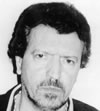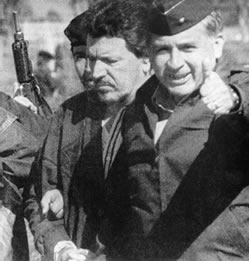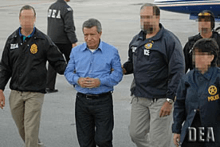Miguel Rodríguez Orejuela
| Miguel Rodríguez Orejuela | |
|---|---|
 Miguel Angel Rodríguez Orejuela | |
| Born |
Miguel Angel Rodríguez Orejuela August 17, 1943 Mariquita, Tolima, Colombia |
| Other names | "El Señor" (The Lord) |
| Criminal penalty |
30 years (360 months) for conspiracy to import cocaine 7.25 years (87 months) for money laundering, sentences to run concurrently. Forfeiture of $2.1 billion in assets. |
| Criminal status | Imprisoned at FCI Edgefield |
| Relatives | Gilberto Rodríguez Orejuela (brother) |
| Conviction(s) |
Conspiracy to import 5kg or more of cocaine. Conspiracy to engage in money laundering |
Miguel Ángel Rodríguez Orejuela (born August 15, 1943)[1][2] is a Colombian drug lord, formerly one of the leaders of the Cali Cartel, based in the city of Cali. He is the younger brother of Gilberto Rodríguez Orejuela. He married Miss Colombia 1974, Marta Lucía Echeverry. [3]
Cali Cartel
The Rodríguez Orejuela brothers and José Santacruz Londoño formed the Cali cartel in the 1970s. They were primarily involved in marijuana trafficking. In the 1980s, they branched out into cocaine trafficking. For a time, the Cali Cartel supplied 70% of the United States and 90% of the European cocaine market.
The Cali Cartel was less violent than its rival, the Medellín Cartel. While the Medellín Cartel was involved in a brutal campaign of violence against the Colombian government, the Cali Cartel grew. The cartel was much more inclined toward bribery rather than violence. However, after the demise of the Medellín Cartel, the Colombian authorities turned their attention to the Cali cartel. The police campaign against the cartel began in the summer of 1995.
Arrest
On August 6, 1995, Rodriguez Orejuela was arrested when the Colombian National Police broke down the door of his apartment (Hacienda Buenos Aires) in the exclusive Normandia neighborhood in Cali, Colombia and found him hiding in a secret closet. Rodriguez Orejuela was not eligible for extradition to the U.S. for crimes committed prior to December 16, 1997. However, while he was detained in Colombia, Rodriguez Orejuela continued to engage in drug trafficking. As a result, the United States requested his extradition.
Released in 2004
Extradition
On March 11, 2005, Rodriguez Orejuela was extradited to the United States. His brother, Gilberto Rodríguez Orejuela, had already been extradited. On September 26, 2006, both Gilberto and Miguel were sentenced to 30 years in prison, after pleading guilty to charges of conspiring to import cocaine to the U.S.[4] They took this deal in exchange for the United States agreeing not to bring charges against their family members. Their lawyers, David Oscar Markus and Roy Kahn, were able to obtain immunity for 29 family members.
On November 16, 2006, the brothers pleaded guilty to one count of conspiring to engage in money laundering. Both were sentenced to an additional 87 months in prison. The two prison terms were set to run concurrently.[5]
Rodríguez Orejuela is serving his 30-year sentence at FCI Edgefield in South Carolina. His release is scheduled to be 2030, at age 87.
Gallery
 |
| Cali Cartel |
|---|
|
Gilberto Rodríguez Orejuela Miguel Rodríguez Orejuela José Santacruz Londoño Hélmer Herrera Buitrago Phanor Arizabaleta-Arzayus Mery Valencia Jairo Ivan Urdinola-Grajales Julio Fabio Urdinola-Grajales Henry Loaiza-Ceballos Victor Patiño-Fomeque Raul Grajales-Lemos Luis Grajales-Posso Juan Carlos Ortiz Escobar |
 Then General of the Colombian National Police, Rosso José Serrano personally escorts Cali Cartel drug lord Miguel Rodríguez Orejuela.
Then General of the Colombian National Police, Rosso José Serrano personally escorts Cali Cartel drug lord Miguel Rodríguez Orejuela. Miguel Rodriguez-Orejuela is escorted by DEA agents after being extradited to the United States.
Miguel Rodriguez-Orejuela is escorted by DEA agents after being extradited to the United States.
In popular culture
- In Caracol 2010 TV Series El cartel is portrayed by the actor Víctor Cifuentes as the character of Emmanuel Villegas.
- Is portrayed by Ricardo Vélez in 2012 TV Series Escobar, el patrón del mal as the character of Manuel González.
- In RCN 2013 TV Series Tres Caínes is portrayed by Jarol Fonseca.
- In RCN TV Series En la boca del lobo is portrayed by Luis Alfredo Velasco as the character of Manuel Ramírez Orjuela.
- In the 2015 Netflix Original series, Narcos, Orejuela is portrayed by Francisco Denis.
See also
References
- ↑ "El Señor" (Spanish). Revista Semana
- ↑ Los Jinetes de la Cocaína (Spanish). Chapter 3
- ↑ "La maldición de ser Miss en Latinoamérica - S Moda EL PAÍS". S Moda EL PAÍS (in Spanish). 2014-11-21. Retrieved 2017-09-15.
- ↑ "Colombian drug lords jailed in Panama". BBC News. September 27, 2006. Retrieved May 12, 2010.
- ↑ "United States Attorney Southern District of New York" (PDF). United States Attorney’s Office. Archived from the original (PDF) on 2012-10-13.